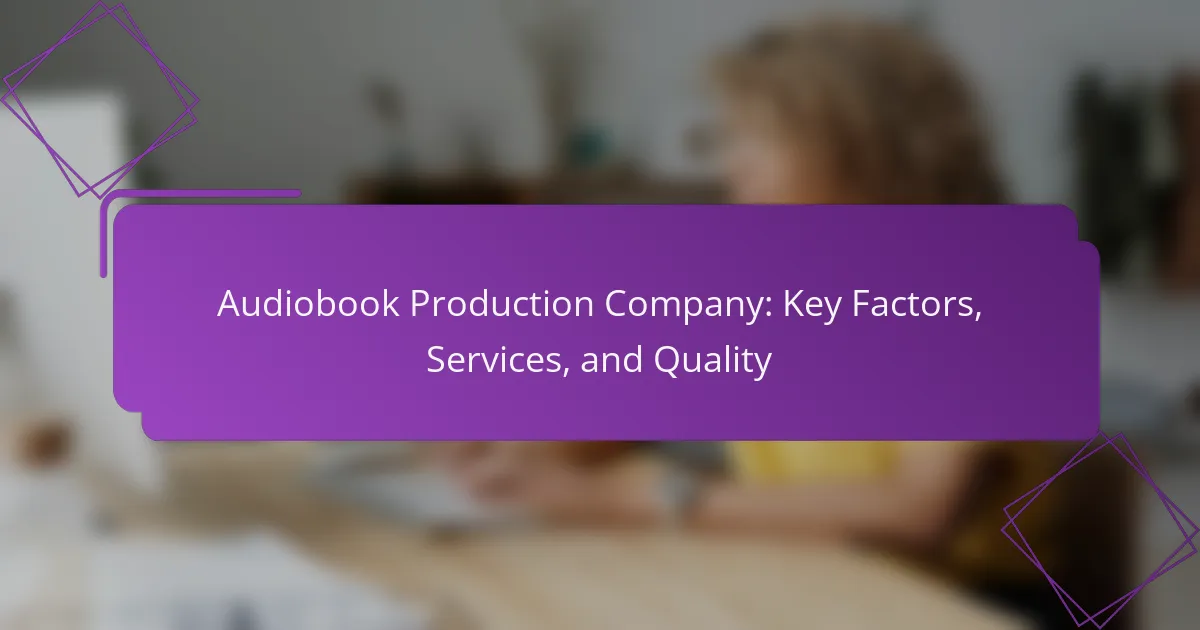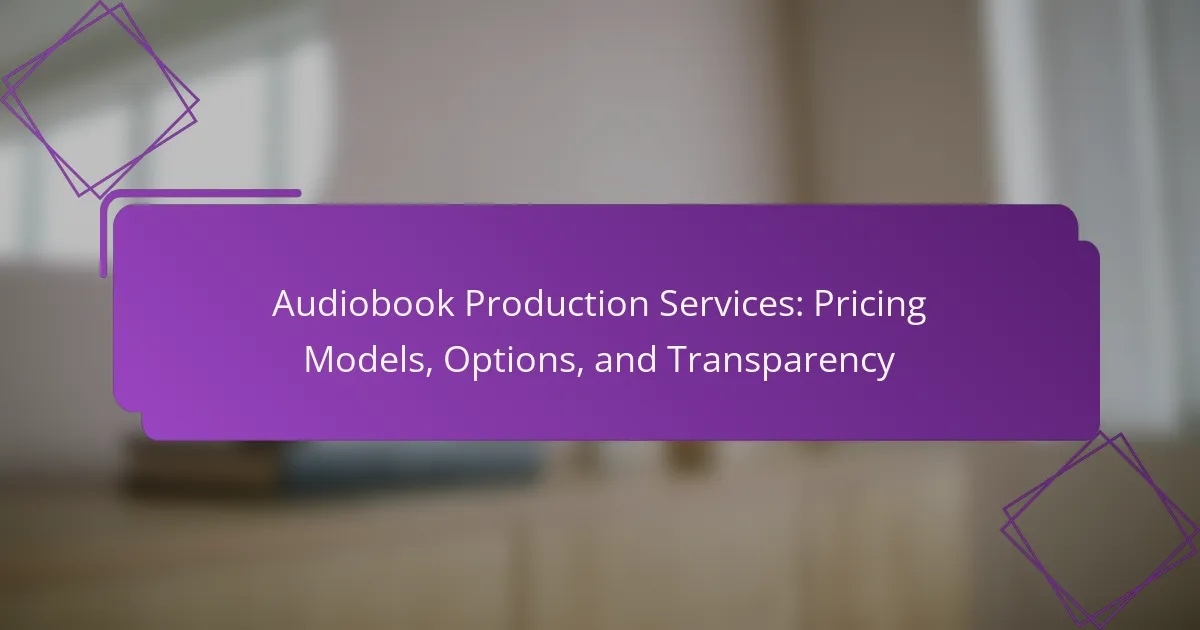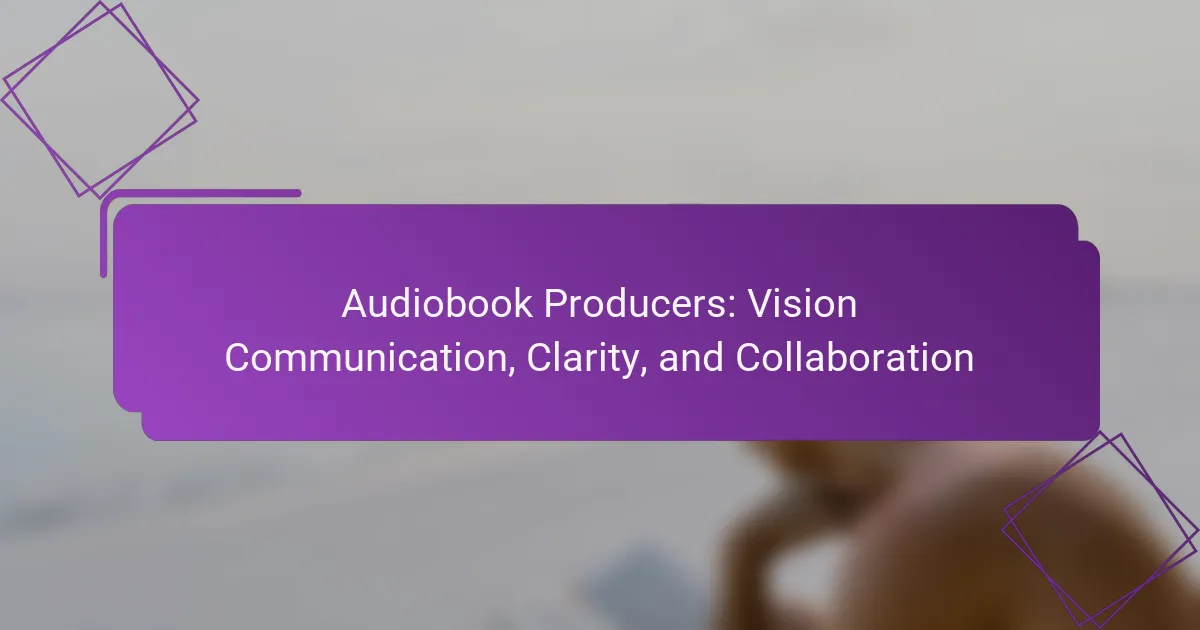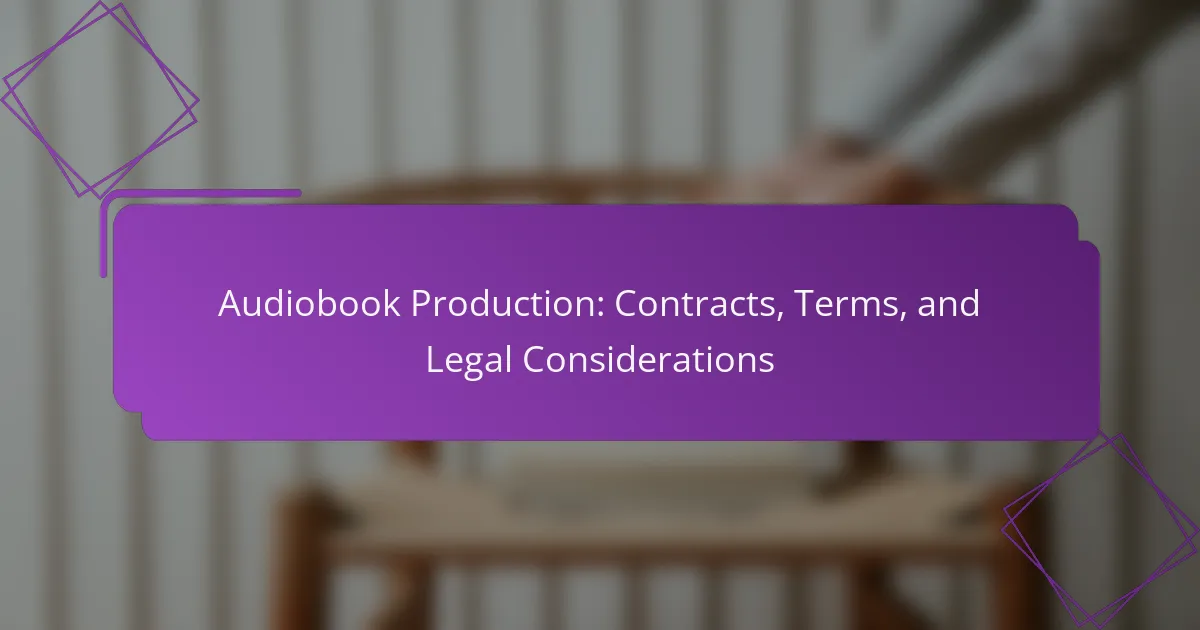Audiobook production companies play a crucial role in bringing literary works to life through audio formats, offering services such as recording, editing, and professional narration. Selecting the right company involves careful consideration of their portfolio, client feedback, and pricing, ensuring that your audiobook meets high-quality standards. Key factors influencing production quality include the equipment used, the expertise of voice talent, and the overall sound environment, all of which contribute to an engaging listening experience.

What services do audiobook production companies offer?
Audiobook production companies provide a range of essential services that facilitate the creation and distribution of audiobooks. These services typically include audio recording, editing and mastering, professional narration, distribution to major platforms, and marketing support.
Audio recording
Audio recording is the foundational step in audiobook production, where the text is transformed into spoken word. This process usually takes place in a soundproof studio, ensuring high-quality sound free from background noise. Companies often use professional-grade microphones and recording equipment to capture clear audio.
When selecting a production company, inquire about their recording facilities and equipment. A well-equipped studio can significantly enhance the final product’s audio quality.
Editing and mastering
Editing and mastering are crucial for refining the recorded audio. Editing involves removing mistakes, pauses, and any unwanted sounds, while mastering ensures the final audio is polished and balanced in terms of volume and clarity. This process can take several hours to days, depending on the length of the audiobook.
Look for companies that offer comprehensive editing services, as this can greatly impact the listener’s experience. A well-edited audiobook will flow smoothly and maintain listener engagement.
Narration by professional voice actors
Narration is a key element that brings the audiobook to life. Professional voice actors are skilled in conveying emotion and character, which enhances the storytelling experience. Companies often have a roster of voice talent to match the tone and style of the book.
When choosing a production company, consider requesting samples of their narrators’ work to ensure their style aligns with your book’s narrative. A strong voice performance can elevate the content significantly.
Distribution to platforms like Audible
Distribution is the process of making the finished audiobook available on various platforms, such as Audible, iTunes, and Google Play. Production companies typically handle the technical requirements and formatting needed for each platform, ensuring compliance with their specific guidelines.
Understanding the distribution channels available can help maximize your audiobook’s reach. Ask about the platforms the company distributes to and any associated costs or royalties.
Marketing support for audiobooks
Marketing support is vital for promoting your audiobook and reaching a wider audience. Many production companies offer services such as social media promotion, press releases, and targeted advertising campaigns. This can significantly increase visibility and sales.
When selecting a company, inquire about their marketing strategies and past successes. A proactive marketing approach can make a substantial difference in your audiobook’s performance in the competitive market.

How to choose the right audiobook production company?
Choosing the right audiobook production company involves evaluating their portfolio, checking client testimonials, comparing pricing structures, and assessing turnaround times. These factors will help ensure you select a company that meets your specific needs and quality expectations.
Evaluate portfolio and samples
Start by reviewing the company’s portfolio to understand their style and quality. Listen to samples of their previous work to gauge their production standards and the types of genres they specialize in.
Look for diversity in their portfolio, as this can indicate versatility in handling various projects. Pay attention to the clarity of narration, sound quality, and overall production value.
Check client testimonials
Client testimonials provide insight into the company’s reliability and professionalism. Look for reviews on their website, social media, and third-party platforms to get a well-rounded perspective.
Focus on feedback regarding communication, adherence to deadlines, and the final product’s quality. Positive testimonials from authors in your genre can be particularly telling.
Compare pricing structures
Pricing for audiobook production can vary widely based on factors like length, complexity, and the experience of the production team. Some companies charge per finished hour, while others may offer package deals.
Request quotes from multiple companies to compare what is included in their pricing. Ensure you understand any additional costs, such as for editing or revisions, to avoid surprises later.
Assess turnaround time
Turnaround time is crucial, especially if you have a specific release date in mind. Inquire about the average time it takes for the company to complete a project of your size and complexity.
Be cautious of companies that promise extremely quick turnaround times without sacrificing quality. A reasonable timeframe for most projects is typically several weeks to a few months, depending on the length and intricacy of the audiobook.

What are the key factors affecting audiobook production quality?
The quality of audiobook production is influenced by several critical factors, including the recording equipment used, the experience of the voice talent, the editing techniques applied, and the soundproofing of the recording environment. Each of these elements plays a vital role in ensuring a professional and engaging listening experience.
Quality of recording equipment
The quality of recording equipment directly impacts the clarity and fidelity of the audiobook. High-quality microphones, audio interfaces, and recording software are essential for capturing the nuances of the voice and minimizing background noise. Investing in professional-grade equipment can significantly enhance the overall sound quality.
For instance, condenser microphones are often preferred for voice recording due to their sensitivity and ability to capture a wide frequency range. Additionally, using digital audio workstations (DAWs) that support high-resolution audio can further improve production quality.
Experience of voice talent
The experience of the voice talent is crucial for delivering a captivating audiobook. Skilled narrators understand pacing, intonation, and character differentiation, which can bring the text to life. Their ability to convey emotion and engage listeners can make a significant difference in the overall quality of the production.
When selecting voice talent, consider their previous work and versatility. Experienced narrators often have a portfolio showcasing their range, which can help in choosing the right voice for your specific audiobook genre.
Editing techniques used
Effective editing techniques are essential for refining the audiobook and ensuring a polished final product. This includes removing mistakes, adjusting pacing, and enhancing audio quality through equalization and compression. Proper editing can eliminate distractions and maintain listener engagement throughout the recording.
Common practices include normalizing audio levels to ensure consistent volume and using noise reduction tools to eliminate unwanted sounds. A well-edited audiobook should flow seamlessly, allowing the listener to focus on the story without interruption.
Soundproofing of recording environment
The soundproofing of the recording environment is vital for achieving high-quality audio. A well-treated space minimizes external noise and echoes, which can detract from the listening experience. Using acoustic panels, carpets, and soundproofing materials can significantly enhance the recording quality.
When setting up a recording space, aim for a quiet area away from traffic and other disturbances. Consider testing the environment with a simple recording to identify any unwanted sounds that may need addressing before the actual session.

What are the pricing models for audiobook production?
Audiobook production pricing models vary widely, typically falling into three main categories: per finished hour pricing, flat rate packages, and royalty share agreements. Each model has its own advantages and considerations, making it essential for authors and publishers to choose the one that best fits their budget and goals.
Per finished hour pricing
Per finished hour pricing is a common model where the cost is based on the final length of the audiobook. Rates can range from around $100 to $500 per finished hour, depending on the narrator’s experience and the production quality. This model is straightforward and allows for clear budgeting based on the expected length of the final product.
When using this model, consider the total length of your manuscript and how it translates into audio. For instance, a 10-hour audiobook might cost anywhere from $1,000 to $5,000. Be mindful that longer books can lead to higher costs, so planning and editing for conciseness can be beneficial.
Flat rate packages
Flat rate packages offer a set price for a defined set of services, often including narration, editing, and mastering. These packages can range from a few hundred to several thousand dollars, depending on the features included. This model is ideal for authors who want predictable costs without surprises.
When evaluating flat rate packages, check what services are included. Some packages may offer additional features like marketing support or multiple formats, which can add value. Always compare different providers to ensure you’re getting the best deal for your needs.
Royalty share agreements
Royalty share agreements involve sharing a percentage of the audiobook’s earnings with the production company or narrator. This model is appealing for authors with limited upfront budgets, as it reduces initial costs. Typically, the split can range from 25% to 50% of royalties, depending on the agreement.
While this model minimizes upfront expenses, it’s crucial to consider long-term implications. If your audiobook performs well, you may end up sharing significant earnings over time. Ensure that you have a clear contract outlining the terms to avoid misunderstandings later on.



